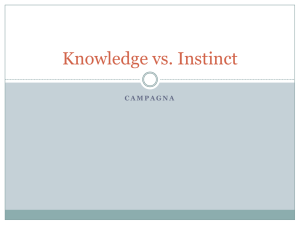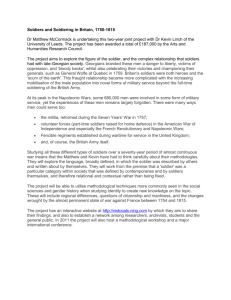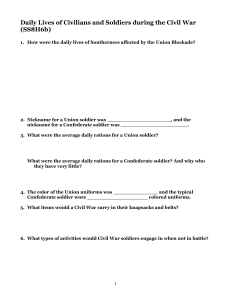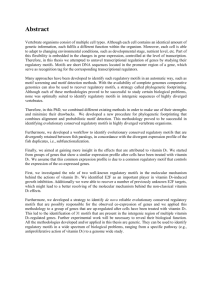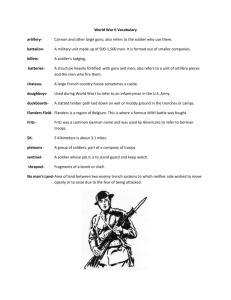Stylistic Devices All_Quiet_On_the_Western_Front
advertisement
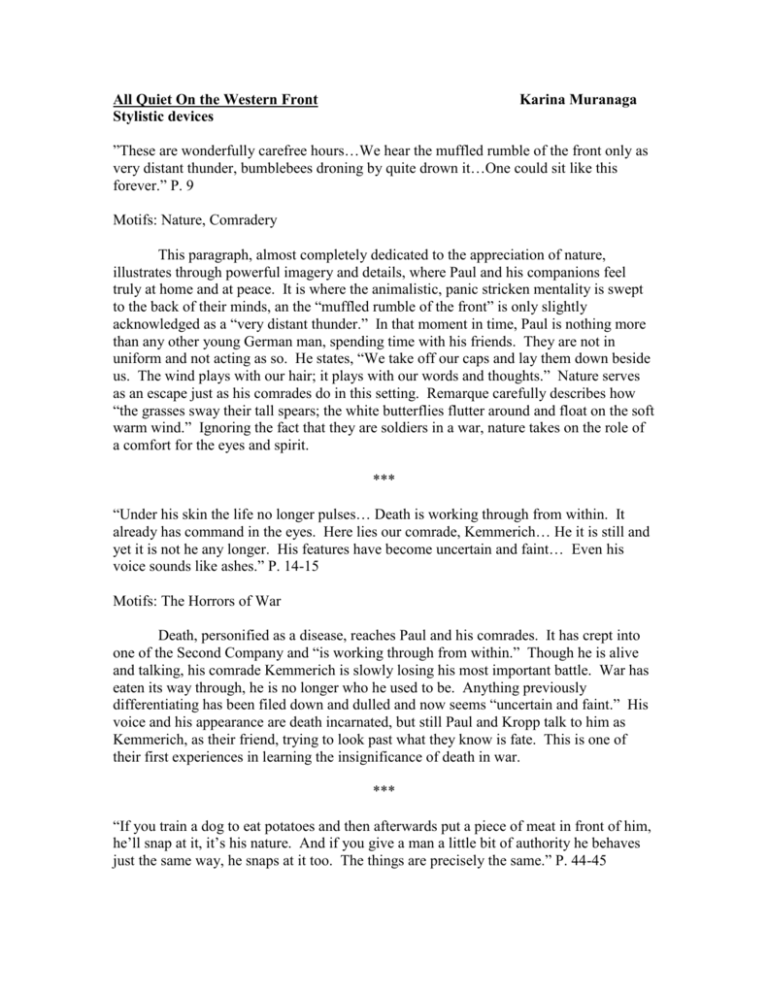
All Quiet On the Western Front Stylistic devices Karina Muranaga ”These are wonderfully carefree hours…We hear the muffled rumble of the front only as very distant thunder, bumblebees droning by quite drown it…One could sit like this forever.” P. 9 Motifs: Nature, Comradery This paragraph, almost completely dedicated to the appreciation of nature, illustrates through powerful imagery and details, where Paul and his companions feel truly at home and at peace. It is where the animalistic, panic stricken mentality is swept to the back of their minds, an the “muffled rumble of the front” is only slightly acknowledged as a “very distant thunder.” In that moment in time, Paul is nothing more than any other young German man, spending time with his friends. They are not in uniform and not acting as so. He states, “We take off our caps and lay them down beside us. The wind plays with our hair; it plays with our words and thoughts.” Nature serves as an escape just as his comrades do in this setting. Remarque carefully describes how “the grasses sway their tall spears; the white butterflies flutter around and float on the soft warm wind.” Ignoring the fact that they are soldiers in a war, nature takes on the role of a comfort for the eyes and spirit. *** “Under his skin the life no longer pulses… Death is working through from within. It already has command in the eyes. Here lies our comrade, Kemmerich… He it is still and yet it is not he any longer. His features have become uncertain and faint… Even his voice sounds like ashes.” P. 14-15 Motifs: The Horrors of War Death, personified as a disease, reaches Paul and his comrades. It has crept into one of the Second Company and “is working through from within.” Though he is alive and talking, his comrade Kemmerich is slowly losing his most important battle. War has eaten its way through, he is no longer who he used to be. Anything previously differentiating has been filed down and dulled and now seems “uncertain and faint.” His voice and his appearance are death incarnated, but still Paul and Kropp talk to him as Kemmerich, as their friend, trying to look past what they know is fate. This is one of their first experiences in learning the insignificance of death in war. *** “If you train a dog to eat potatoes and then afterwards put a piece of meat in front of him, he’ll snap at it, it’s his nature. And if you give a man a little bit of authority he behaves just the same way, he snaps at it too. The things are precisely the same.” P. 44-45 Motifs: Animal Instinct, Effects of War on Individuals, Politicians/Peasants Unlike other animals, humans have developed a way of masking and sometimes almost eliminating instinct. But on the front line, and during any service as a soldier that animal instinct once muffled is defined more than ever. Just as a dog would snap at a piece of meat put in front of him, a man put in uniform and given authority will also. In the army, different levels of authority are essential for its continuance and stability; there always has to be someone more powerful. If there weren’t, those actually fighting would seize fire and the war would be over, no side winning over the other. The soldiers - the boys plucked from their old lives, the peasants – aren’t the ones who created the war, or those who even agree with it. But they have fallen in and almost like a poison, the war has transformed them into dogs themselves. *** “To no man does the earth mean so much as to the soldier… when he buries his face and his limbs deep in her from the fear of death…then she is only his friend, his brother, his mother…” P. 55 Motifs: Earth, Animal Instinct On the front line all a soldier has to protect him is his instinct. He relies on his true nature that works always in harmony with the earth. The earth is a source of protection and is always there. In the book it represents a constant that existed long before the war, endured it, and will still exist after the last bomb is detonated. It’s a neutral shield for men on any side whether they’re fighting on land of their country or of their enemies it always offers the same protection. When a soldier is fighting for his survival, it can feel as close and beloved as their own mother. *** “Here the heads become figures… They become a column. The column marches on, straight ahead…A column – not men at all. “ P. 57 Motifs: Dehumanization, Indifference Paul and the other soldiers on his side don’t know anything about the soldiers marching towards them except that they are the enemy. Not individually, or even those marching in particular, they only wear the symbol of the enemy. Paul and his comrades feel no emotion and are indifferent whether those in the “dark wedge” making their way towards them live on or die and lay unburied, because if they felt such sympathy or remorse they wouldn’t still be standing. In the “milky pool” of an atmosphere, such feelings only pose as obstacles in their strive to come out alive able to go on, and go on as unaffected as they can. This quote is a valid example of how faces are wiped away, and minds become clouded. *** “And to whom does it matter whether he has them or not - …” P. 72 Motif: Significance/Insignificance of Death The further into the war, more recruits come to fill the empty beds of fallen soldiers. Most of them are young and not nearly capable of surviving the front line but they are still put in uniform and shipped away. The men, or boys, put in uniform are no longer trained or even taught, they are merely fills to empty posts. Old or young, experienced and knowledgeable or not they are there to restock and repopulate. The young recruit dies after his first battle as just a new recruit. He has a family, had his life and his future but now is just another fallen soldier soon to be replaced. The conditions of war don’t leave room for such acknowledgment. Just to go on living, death can only be taken as slight mishap or statistic. *** “Monotonously the lorries sway, monotonously come the calls, monotonously falls the rain. It falls on our heads and on the heads of the dead up in the line, on the body of the little recruit… it falls on Kemmerich’s grave; it falls in our hearts. An explosion sounds somewhere. We wince, our eyes tense, our hands ready to vault over the side of the lorry into a ditch…” P. 74 Motifs: Effects of War on Individuals, Nature, Dehumanization Soldiers become more like robots if at all functional in the trenches. In this passage the author’s repetition and simple, choppy syntax reflects their behavior. They are no longer people but drones directed to kill those labeled to be killed and forget those who have been killed by them. This quote however also shows the instances in where Paul does feel or at least remember. He mentions Kemmerich, his comrade and so has not been completely rewired yet. But his body, even his simple reflexes function only in accordance to the war. With the sound of an explosion he immediately switches into survival mode unconsciously. He can’t help but react. The rain comes in to purify the earth as much as it can of the blood, and the shell casings, and the bodies, but so close after battle it can’t help them escape their numbness as it does back at camp. In a way, it represents the only way in which those who didn’t survive are purified and acknowledged to some degree. *** “But here in the trenches they are completely lost to us…even if these scenes of our youth were given back to us we would hardly know what to do… it would be like gazing at the photograph of a dead comrade; those are his features, it is his face, and the days we spent together take on a mournful life in the memory; but the man himself it is not.” P. 121-122 Motifs: Memories, The Effects of War on Individuals, Lost Youth To the generation of young men to which Paul belongs to, the war sucked them away from their youth and their childhood and spit them back out onto the front line. A place where acting on anything they had learned up to this point would only distract them in trying to survive the down poor of fire arms. In the trenches the memories of their childhood “are completely lost to [them],” and even if they could be regained, the erasure of feeling and anything not essential to continue living leaves them not knowing how to even feel, or do with them. The closeness Paul and the other soldiers felt for things prior to the war are recognizable but not capable of instilling those emotions again, they do not know how to break through the hard exterior to feel again. They would only become a melancholy blur in the distance. *** “Ah! Mother, Mother! You still think I am a child – why can I not put my head in your lap and weep? Why have I always to be strong and self-controlled? I would like to weep and be comforted too, indeed I am little more than a child; in the wardrobe still hang short, boy’s trousers – it is such a little time ago, why is it over?” P. 183 Motifs: Lost Youth, Effects of War on Individuals, War Life vs. Home Life The war swallowed Paul and those of his generation at such a time that it took their youth and their growth into adults. Those older that enlisted later in life have wives and children, a life that isn’t the war. Paul has only his mother and other family and his friends but his youth was taken away and it’s taking him from his family when he needs them the most. When he returns home he starts to feel emotion again and wishes he could go back to being a boy who didn’t have to always be fighting for his life and have one outside of the war zone. His youth was abruptly interrupted and became more necessary and more desired. Having to always keep composure and be strong on the outside has gnawed at him from the inside out from the start. *** “I often become so lost in the play of soft light and transparent shadow, that I almost fail to hear the commands. It is when one is alone that one begins to observe Nature and to love her. And here I have not much companionship, and do not even desire it. We are too little acquainted…” P. 189 Motifs: Nature, Effects of War on Individuals The one thing that managed to escape being eaten by the war is nature itself. While Paul and the others are pushed into the movement, nature is always present to take them away even if it’s just for a second, or to protect them when it’s one second that counts. But it’s hard to have a true connection - to embrace it - during a time when feelings could cost a soldier his life. And so not feeling becomes means of survival and obliviousness to anything that is a distraction. The war, the front line, is so that one doesn’t even have desire for such a connection. *** “He plays mostly folk songs and the other hum with him… The voices cease and the violin continues alone. In the night it is so thing it sounds frozen; one must stand close up; it would be much better in a room – out here it makes a man grow sad.” P. 195-196 Motifs: Music It is a major idea dispersed in the book that the people on the other side are the enemy but in reality they are just the same. Music solidifies this concept in bringing otherwise-labeled enemies together through music. The violinist, a Russian, is on the other side of the fence but gains the respect and gratitude of Paul. Paul grows to see the people behind the uniform the longer the war goes on and in the instant in which the violinist is playing and the music pierces as if frozen through the air, he is listening to a talented musician not the enemy. The violinist plays music worthy of a hall and room of anxious listeners that would only lift their spirits and hearts, but out in the cold, imprisoned by a distant authority, it only makes those who hear it reminisce and wish for different days. *** “ ‘Comrade, I did not want to kill you… Take twenty years of my life, comrade, and stand up-take more, for I do not know what I can even attempt to do with it now.’ ” P. 223 Motifs: Effects of War on Individuals, Animal Instinct/Survival Instincts On the front like a solder has to act on instinct and command. In this passage Paul experiences the boiling of his emotions with the consequences of his nonpremeditated, instinctual actions to the point where he reaches his mental breaking point. As he sat in the shell hole he didn’t plan to stab and kill Gérard Duval – a printer, husband, and father – his raw animal instincts to solely survive moved him to fear anybody or anything that entered his safe-haven of a shell hole. Paul solemnly apologizes to the soldier, “you were only an idea to me before, an abstraction that lived in my mind and called forth its appropriate response”(p. 223). From a distance, across the barbed wire fence, Duval was the enemy, but now lying across from Paul he is just like him. He questions, “How could you be my enemy? If we threw away… this uniform you could be my brother just like Kat and Albert.” During war, those leading it segregate the world into different sides, it’s not the decision of those fighting. A soldier shoots at the labeled enemy as the enemy shoots at him, but outside of the dark, suffocating atmosphere they’re one and the same. *** “ I am no longer a shuddering speck of existence, alone in the darkness- I belong to them and they to me; we all share the same fear and the same life, we are nearer than lovers… I could bury my face in them, in these voices, these words that have saved me and will stand by me.” P. Motifs: Comradery, War Life, Animal Instinct After returning from leave Paul is neither the person he was before the war, nor the cold, numb soldier it transformed him into. He is lost. On the front line, memories and ideas rush through his head only clouding his ability to not think, just act. Memories of what his mom said to him at home, memories of the world outside of the battle zone. But the thing that can save him finally reaches him in the voices of his comrades. He now has a focus, and desire to reach those voices and those they come from because to him they represent life, and happiness. He belongs to something, to them. They are all in the war and know what it’s really like. Something they discovered together and will always share. They know what it feels like to be the other, to be trapped in a shell hole, to kill with their bare hands to try to survive, or to go on not knowing if one of their comrades is alive or lost somewhere in the shell holes slowly being taken by death. In a situation where Paul was completely lost and on the point of breaking down, these voices pull him away from death’s grasp. “Before us lay rainy weeks – grey sky, grey fluid earth, grey dying. If we go out, the rain at once soaks through our overcoat and clothing; - and we remain wet all the time we are in the line. We never get dry… everything is fluid and dissolved, the earth one dripping, soaked, oily mass in which lie yellow pools with red spiral streams of blood and into which the dead, wounded, and survivors slowly sink down.” P. 286 Motifs: Earth, Nature, The Horrors of War Deep into the war, even the earth and the sky themselves have been involved in an endless struggle. The rain comes as if to try to take away the blood shed, the people lost, and the damage to the earth that has come from the war. Color has been sucked from every corner and all that remains is gray, and the black of blood. The soldiers go to the front line still, but they “remain wet… [They] never get dry… everything is fluid and dissolved.” They are absolutely drenched in death, in war, and loss. The earth, now a “dripping, soaked, oily mass” swallows the bodies of the dead, the wounded and even the survivors, what life do they have anyways. Nothing holds strong, everything is falling apart, mixing. Nothing will ever regain its original self. The war will be a part of the earth, and of the people who lived it forever.

